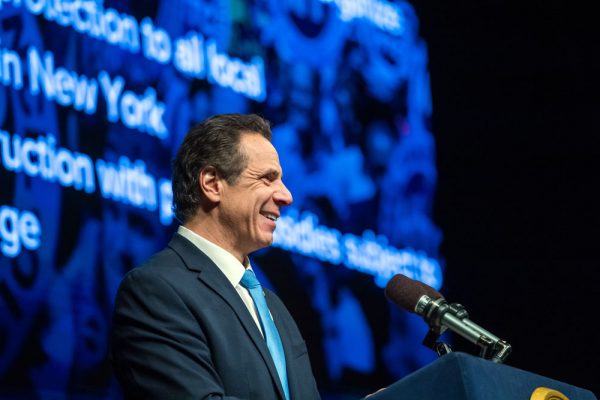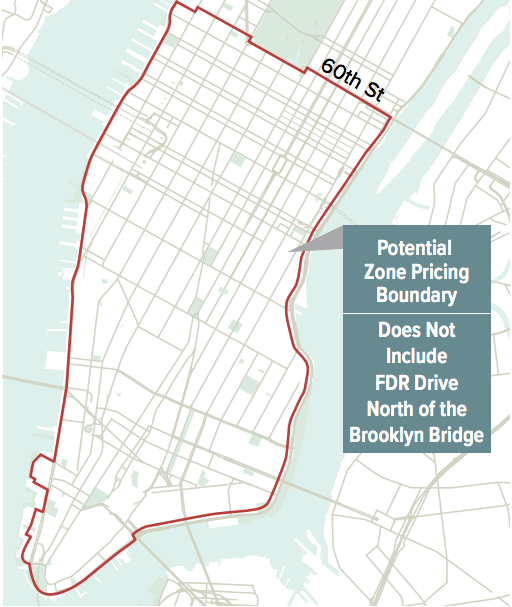
Gov. Andrew Cuomo Delivering the State of State Address (Photo: Cuomo)
Jan. 16, 2019 By Christian Murray
Governor Andrew Cuomo urged lawmakers to pass legislation this year that would charge motorists a fee for entering Manhattan below 60th Street.
Cuomo said that the charge, known as congestion pricing, would help fund a crumbling subway system by raising $15 billion in coming years. He said it would also reduce gridlock around the toll-free entry points to Manhattan, such as the Queensboro Bridge.
“We need to do it this year,” Cuomo said during his State of the State speech yesterday. “Riders are fed up, the situation only gets worse. It’s like the old commercial: you can pay me now or you can pay me later. The system is just continuing to deteriorate.”
The elected officials who represent western and central Queens told the Queens Post yesterday that they are largely supportive of the congestion pricing concept. However, officials who represent more suburban Queens districts, which are not served by the subway, are more skeptical.
The plan, which was put together by a task force convened by the governor in 2017, would charge every passenger vehicle and truck a toll that enters Manhattan below 60th Street.
The task force, called Fix NYC, proposed a charge of $11.52 for cars and $25.34 for trucks that enter the zone. Vehicles that come in via the MTA’s tolled East River crossing–such as the Queens-Midtown tunnel—would be credited.
Cuomo said the plan would be equitable and would reduce “bridge shopping.” Currently, commuters can cross the Brooklyn, Manhattan, Williamsburg and Queensboro bridges for free—yet are tolled when using the Queens-Midtown and Hugh L Carey tunnels, as well as other bridges.
“I’m a Queens boy,” Cuomo said. “You can take the 59th Street [Queensboro] bridge and not pay a toll or you can go through the Queens-Midtown tunnel and pay a toll. I’m cheap, so I go through the 59th Street Bridge. But literally you are directing traffic by where there’s a toll-free bridge and where there’s not a toll-free bridge.
The Fix NYC plan would also add a surcharge to for-hire vehicles that go into the district, which would be passed onto the consumer.
While the finer points of the plan still need to be determined, many Queens legislators back the concept.
Assemblymembers Aravella Simotas (D-Astoria), Catalina Cruz (D-Jackson Heights), Andrew Hevesi (D-Forest Hills) and Michael DenDekker (D-East Elmhurst) told the Queens Post that they support congestion pricing. Additionally, State Senators Mike Gianaris (D-12th District) and Jessica Ramos (D-13th District) have expressed support.
SImotas said that congestion pricing is needed since residents require a system that they can rely on. “What we have now is a broken system with awful service, chronic delays and an atrocious lack of accessibility [for the elderly and disabled],” she said in a statement.
She said that congestion pricing provides a sustainable source of funding if it is done correctly.

Fix NYC
But some Queens legislators are unsure about the concept at this point.
State Senator Joseph Addabbo (D-15th District) said in a statement that he is still deciding. “I am looking into all the pros and cons of this initiative before I make a decision to support something as major as this.”
Assemblymember Nily Rozic (D-Flushing), who represents a section of greater Flushing that isn’t served by the subway, has not decided at this point, according to her spokesperson. She is still talking to constituents.
Assemblymember Brian Barnwell (D-Maspeth) said he wants to see a bill before announcing his support for or against.
Meanwhile, Assemblymember David Weprin (D-Fresh Meadows) is outright opposed to congestion pricing. He said that the neighborhoods in northern, southern and eastern Queens are not close to the subway and cannot afford a tax hike in the form of congestion pricing.
“A congestion tax would be disastrous for Queens, Brooklyn and Long Island residents,” Weprin said in December. “It could cost a commuter an additional $3,000 a year in expenses.”
Assemblymember Cathy Nolan (D-Long Island City) could not be reached for comment by the time of publication.
Cuomo said that the funds raised via congestion pricing are needed since the MTA needs $40 billion in the next decade just to modernize the subway. He said that cost, over and above what is raised via congestion pricing, should then be split between New York City and the state.
